|
|
|
Sort Order |
|
|
|
Items / Page
|
|
|
|
|
|
|
| Srl | Item |
| 1 |
ID:
144641
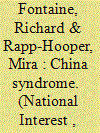

|
|
|
|
|
| Summary/Abstract |
CHINA’S RAPID ascent to great-power status has, more than any other international development, raised concerns about the future of the liberal international order. Forged in the ashes of the Second World War, that order has enabled a seven-decade period of great-power peace, the expansion of democratic rule and a massive increase in global prosperity. Now, it seems, world order is under threat—not least from China’s rising power. While Beijing has thus far avoided active military aggression and refrained from exclusionary economic arrangements, American policymakers worry quite openly about China’s challenge to the underlying rules of the road. They hope that Beijing will embrace the existing pillars of global order and even work to support them; they fear that China will prove revisionist, seeking to undermine the rules-based order and fashion an illiberal alternative that excludes the United States.
|
|
|
|
|
|
|
|
|
|
|
|
|
|
|
|
| 2 |
ID:
122008


|
|
|
|
|
| Publication |
2013.
|
| Summary/Abstract |
In the abundant recent analysis of a nuclearising Iran, scholars and other experts have identified several dangers. The Iranian regime could bully regional rivals, increase its influence in Iraq, further challenge US power in the Gulf and set off a proliferation cascade. Another oft-cited danger is that, protected from retaliation by its nuclear shield, Iran will step up its support for proxy groups in the Middle East. Even without increased backing from Tehran, Hizbullah and Hamas may be emboldened to increase their attacks on Israel, believing that they are covered by an Iranian 'nuclear umbrella'. With a few exceptions, however, most recent analysis fails to explain how Iran would use the bomb to bring about such changes. As outlined by Paul R. Pillar, professor at Georgetown University, most commentary 'links Iran with sundry forms of objectionable behaviour, either real or hypothetical, without explaining what difference the possession of a nuclear weapon would make'. To understand the threats posed by a nuclear-armed Iran, therefore, and to devise policies to avert or mitigate these dangers, we must analyse the causal link between nuclearisation and its potential consequences.
|
|
|
|
|
|
|
|
|
|
|
|
|
|
|
|
| 3 |
ID:
170575
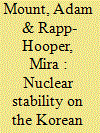

|
|
|
|
|
| Summary/Abstract |
he US and South Korea must afford Pyongyang a rational expectation of security but no hope of winning a limited conflict.
|
|
|
|
|
|
|
|
|
|
|
|
|
|
|
|
| 4 |
ID:
166154


|
|
|
| 5 |
ID:
147107
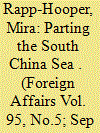

|
|
|
|
|
| Summary/Abstract |
July 12, 2016, marked a turning point in the long-standing disputes over the South China Sea. After more than three years of proceedings at the Permanent Court of Arbitration, an international body in The Hague, a tribunal constituted under the UN Convention on the Law of the Sea (UNCLOS) issued a widely anticipated decision in a case the Philippines brought in 2013 to challenge China’s maritime claims [2] to most of the contested waterway
|
|
|
|
|
|
|
|
|
|
|
|
|
|
|
|
| 6 |
ID:
158871
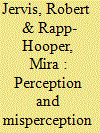

|
|
|
|
|
| Summary/Abstract |
North Korea has all but completed its quest for nuclear weapons. It has demonstrated its ability to produce boosted-fission bombs and may be able to make fusion ones, as well. It can likely miniaturize them to fit atop a missile. And it will soon be able to deliver this payload to the continental United States. North Korea’s leader, Kim Jong Un, has declared his country’s nuclear deterrent [1] complete and, despite his willingness to meet with U.S. President Donald Trump, is unlikely to give it up. Yet Washington continues to demand that Pyongyang relinquish the nuclear weapons it already has, and the Trump administration has pledged that the North Korean regime will never acquire a nuclear missile that can hit the United States. The result is a new, more dangerous phase in the U.S.–North Korean relationship: a high-stakes nuclear standoff.
|
|
|
|
|
|
|
|
|
|
|
|
|
|
|
|
| 7 |
ID:
169179
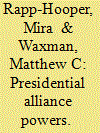

|
|
|
| 8 |
ID:
176446


|
|
|
|
|
|
|
|